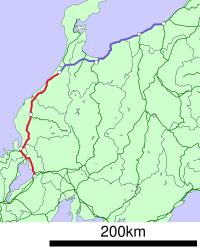Hokuriku Line
| Hokuriku Main Line | |||
|---|---|---|---|
| A B | |||
 |
|||
| Overview | |||
| Native name | 北陸本線 | ||
| Type | Heavy rail, Passenger/freight rail Regional rail, Intercity rail |
||
| System | JR West | ||
| Status | Operational | ||
| Locale |
Shiga Prefecture Fukui Prefecture Ishikawa Prefecture |
||
| Termini |
Maibara Station Kanazawa Station |
||
| Stations | 43 | ||
| Operation | |||
| Opened | Stages between 1882-1902 | ||
| Closed | 14. 3. 2015: Kanazawa - Naoetsu (Converted to the three sectors of the private railway) | ||
| Owner | JR West | ||
| Operator(s) | JR West, JR Freight | ||
| Technical | |||
| Line length | 176.6 km (109.7 mi) | ||
| Track gauge | 1,067 mm (3 ft 6 in) | ||
| Electrification | 1,500 V DC, 20 kV/60 Hz AC overhead line | ||
| Operating speed | 130 km/h (80 mph) | ||
|
|||
The Hokuriku Main Line (北陸本線? Hokuriku-Honsen) is a 176.6 kilometer railway line owned by West Japan Railway Company (JR West) connecting Maibara Station in Maibara, Shiga, with Kanazawa Station in Kanazawa, Ishikawa. It serves the Hokuriku region on the northern central coast of Honshu, the largest island of Japan, as well as offering connections to the regions of Kansai, Tōkai, Kantō, and Tōhoku.
The line is an important transportation artery along the Sea of Japan coast, because the Shinkansen high-speed network has not yet been extended through the Hokuriku region. The Hokuriku Shinkansen was opened on March 14, 2015 between Nagano and Kanazawa, therefore the interval between the Kanazawa Station and the Naoetsu Station was converted to the three segments of private railway companies; the remaining segment onward to Kansai is still in the planning stages. As a result, narrow gauge limited expresses such as the Thunderbird and Shirasagi are common sights along the line.
The Hokuriku Main Line has double track and is completely electrified: the section from Maibara to Tsuruga use 1,500 V DC power, while the section from Tsuruga to Kanazawa uses 20 kV AC, 60 Hz power.
...
Wikipedia
